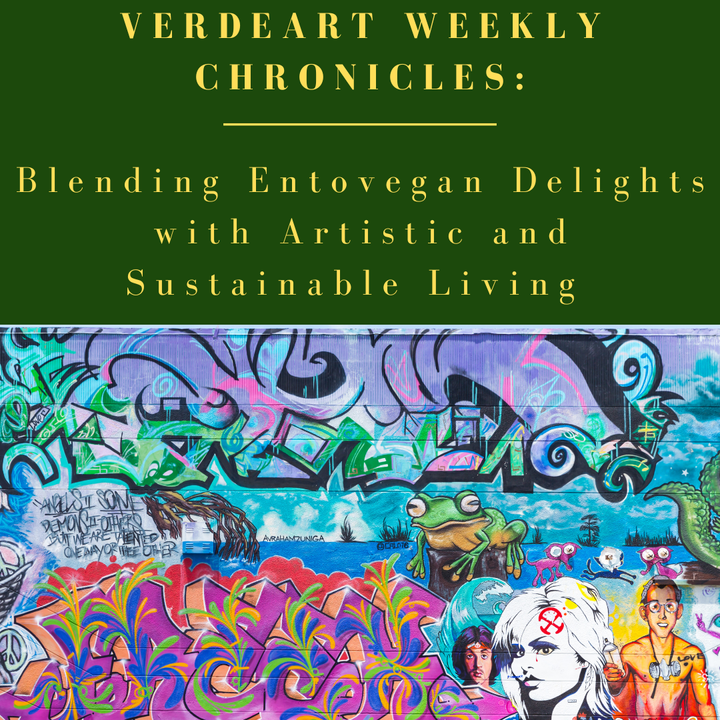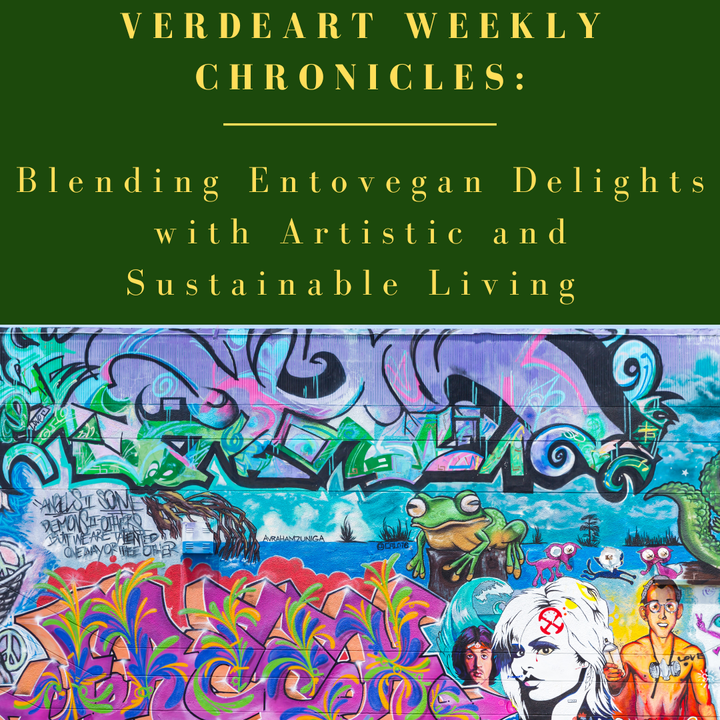VerdeArt Weekly Chronicles: Blending Entovegan Delights with Artistic and Sustainable Living - March 29, 2024
VerdeArt Weekly Chronicles: A vibrant summary through the past, present, and future of entomophagy—where culinary art meets scientific exploration and human consumption of edible insects—highlighting sustainable nutrition, eco-conscious lifestyles, environmental principles, and the impact of eco-art
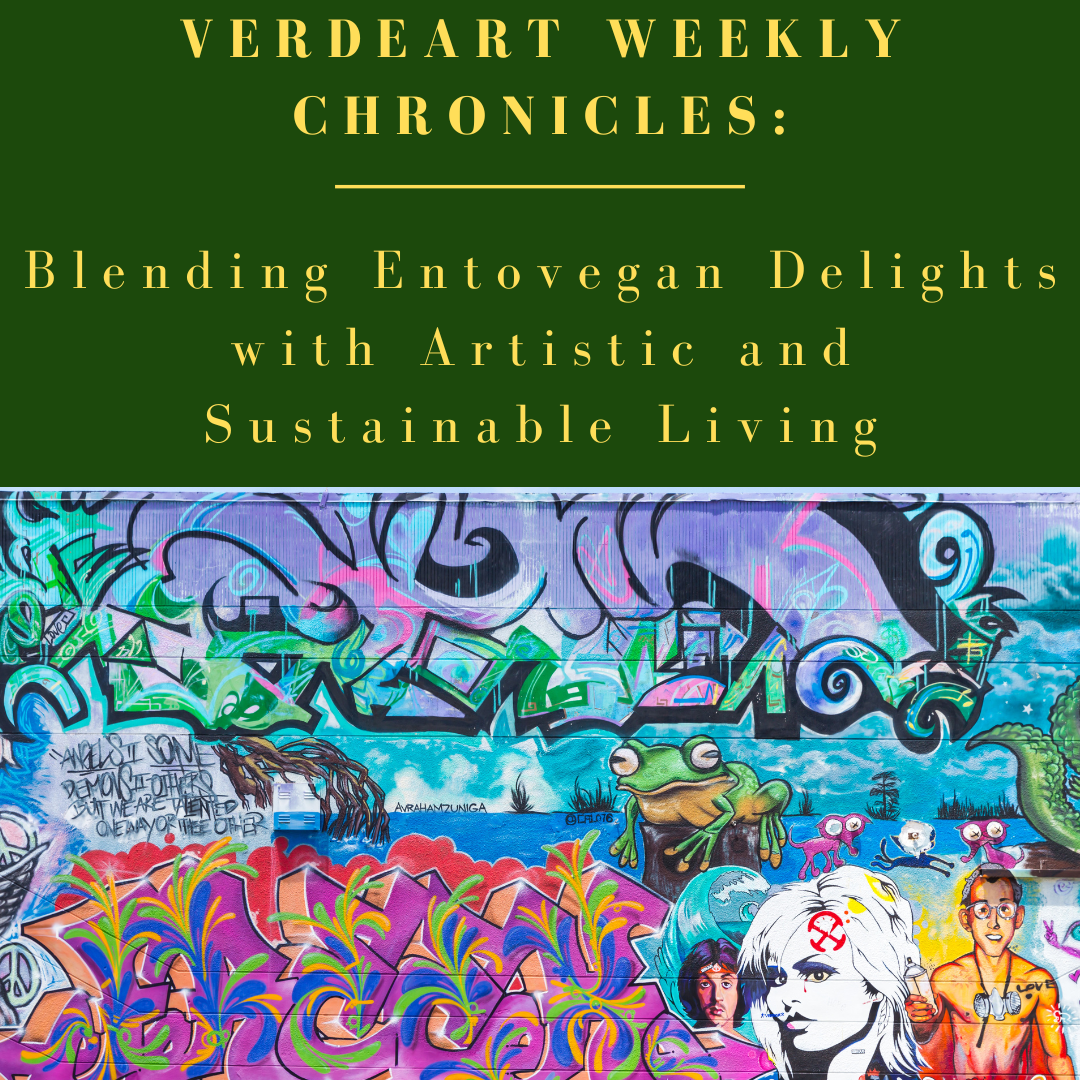
Hello fellow food enthusiasts and eco-conscious adventurers on this day, March 29, 2024. Today I am pleased to announce in our Atelier Journal the latest developments from our team at the VerdeArt community and activities around our Entomophagy 101 concept and our daily sustainable lifestyle, with a special about 'Embracing the Delicious Sustainability of Entoveganism'
There's a saying: "Tell me what you eat, and I will tell you who you are." If you've arrived at this webpage and are reading this article, it's likely that you're a culinary adventurer or an Entomophagist, Entomovegan or Entovegan, or at least considering becoming one.
In the exploration of Entoveganism, our connection to the ancient practice of Entomophagy acquires new significance against the backdrop of today's environmental crises. While this tradition stretches back through millennia, its relevance has never been more pronounced than in our current struggle to decrease greenhouse gas emissions and enhance food production sustainability. The adoption of edible insects, a practice rooted deeply in human history, emerges as a compelling answer to some of the most pressing challenges of our times, including environmental degradation, climate change, hunger, and malnutrition.
My journey into the realm of Entoveganism began with a simple, yet profoundly impactful dish: crickets (Acheta domesticus). Their rich, nutty flavor was not just a culinary revelation but a stark symbol of sustainability. This eye-opening experience underscored the incredible potential of Entomophagy to transform our future of food systems and, by extension, our planet's ecological future. Incorporating arthropods into our diets is a step beyond eco-friendly nutrition; it's a leap towards a sustainable future.
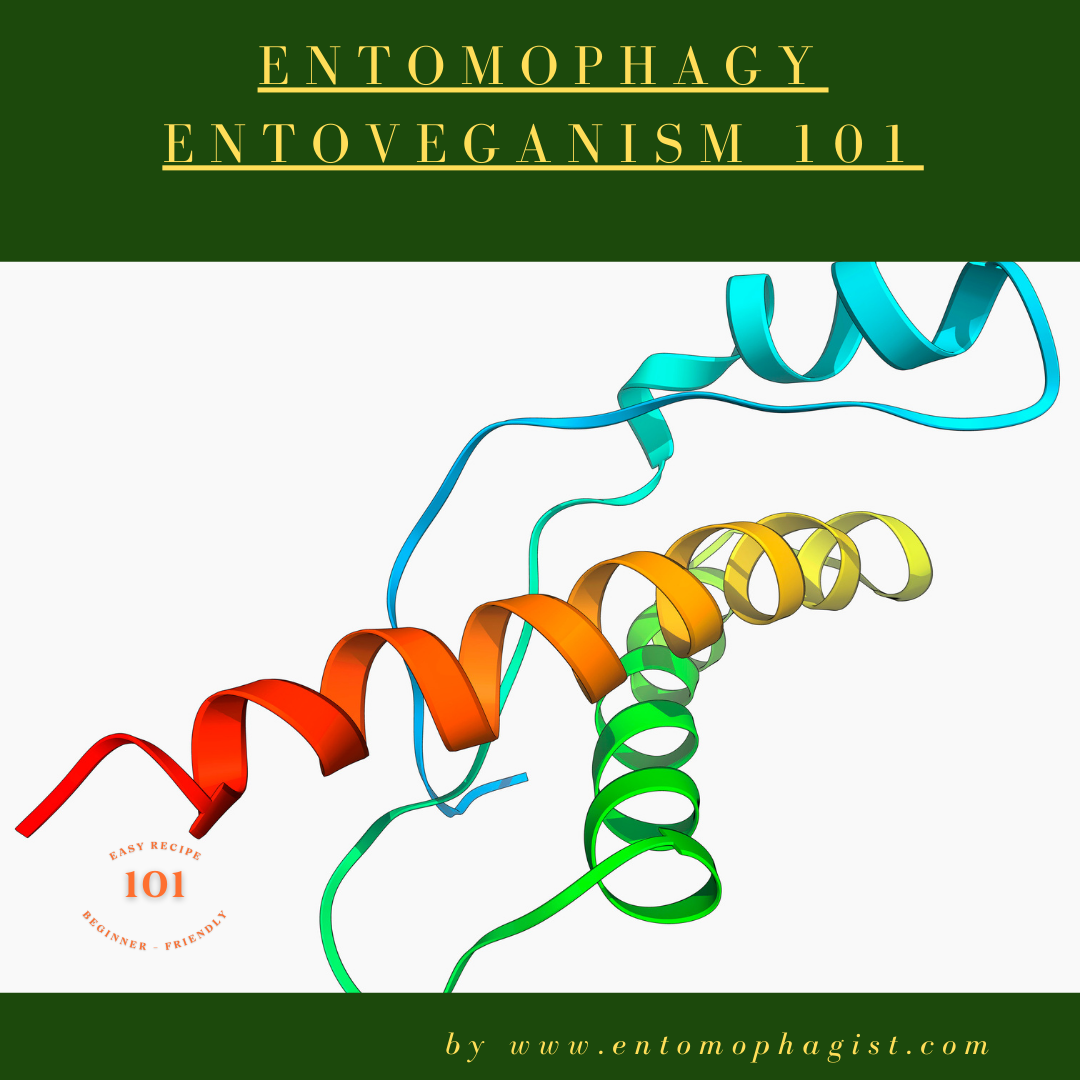
The environmental and economic benefits of embracing Entoveganism are manifold. Insect farming stands as a stark contrast to conventional livestock agriculture, which is a significant contributor to global greenhouse gas emissions like methane. Livestock production is not only resource-intensive, requiring vast amounts of land, water, and feed, but it also contributes to deforestation, biodiversity loss, and water pollution. Insects, on the other hand, require a fraction of these resources. Perhaps the most impressive aspect is their remarkable growth rate - crickets can multiply their body weight by up to 800 times within a month of hatching. This exponential growth leads to a highly productive and renewable gentle food source with a minimal environmental impact. For example, producing the same amount of protein from crickets instead of animal products like beef and pork can reduce greenhouse gas emissions by up to 80%, according to recent studies. This dramatic difference showcases the potential of Entoveganism to mitigate the impacts of our dietary choices on the planet.
Furthermore, as we venture into the future with climate change and strive for sustainability, it becomes vital to address any reservations directly. Some might wonder about the safety and culinary appeal of integrating insects into their diet. Rest assured, buggs-based food is consumed by billions worldwide, prepared in a variety of delicious ways that cater to every palate. In various cultures, insects are included in many dishes and their flavor is often compared to certain types of shellfish. Indeed, individuals with shellfish or crustacean allergies are usually advised not to consume insects, as they contain similar allergens. By demystifying Entomophagy and presenting it as a versatile and enjoyable dietary option, we can overcome these barriers together.
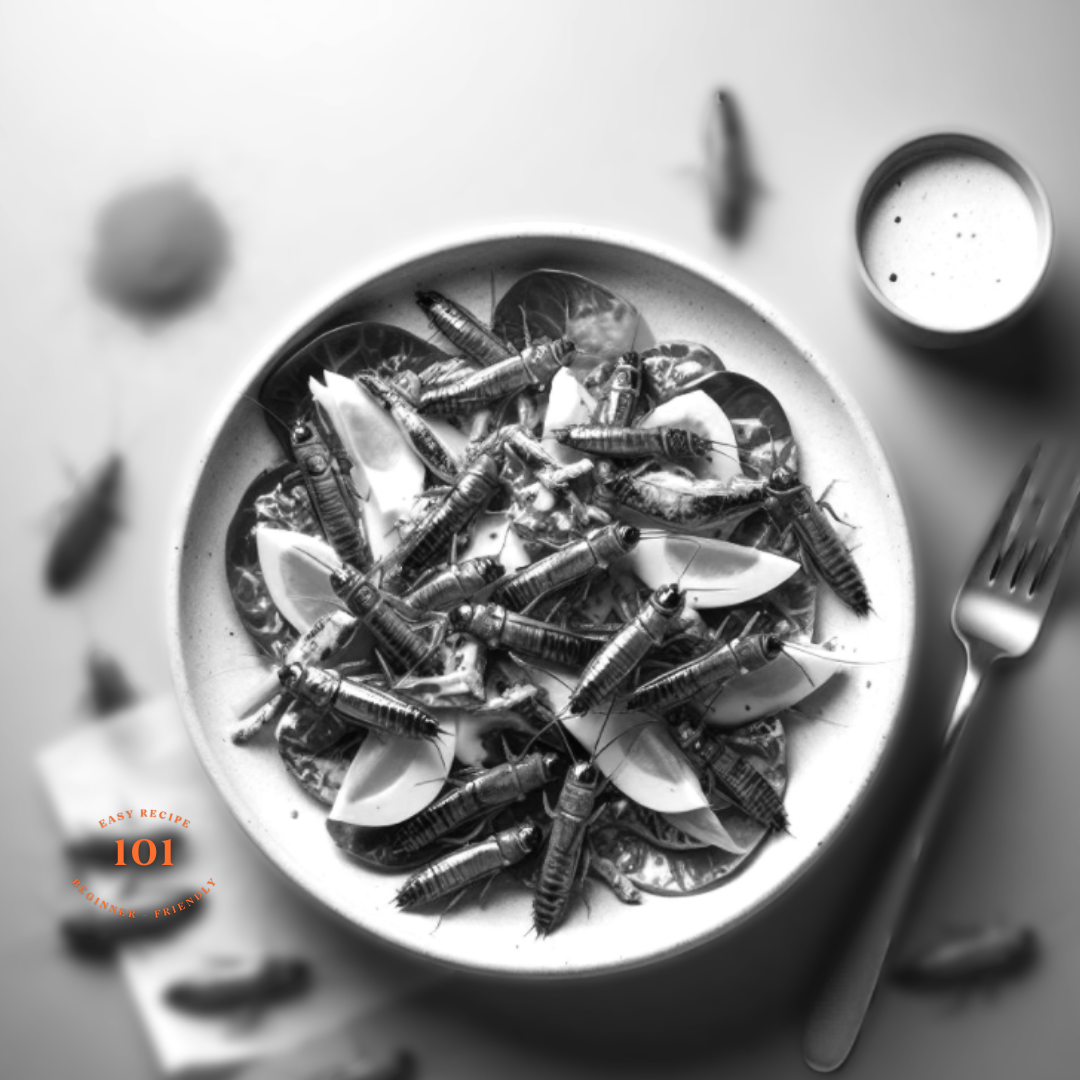
Driven by our passion for pioneering sustainable culinary solutions, instead of just treading water, Chef Luciano, our artisan of Entovegan culinary innovation, and I, your humble guide through the fascinating world of Entomology and author behind the scenes, have been diligently working on an exciting new recipe for the past few weeks. Far from being idle, we've been like busy bees (or should I say crickets?), with Chef Luciano channeling his kitchen genius and me bringing a bounty of Entomological insight to create something truly groundbreaking. Our latest brainchild, the Best Crunchy Crickets & Salty Anchovies Caesar Salad Recipe, diverges from the traditional and classic Caesar salad.
This dish features a bold symphony of stir-fried crickets and savory salty anchovies, tossed with fresh, organically farmed romaine lettuce—a blend so innovative it might just flip your culinary world upside down. And, as we forge ahead with our Entomophagist journey, it's not just about the thrill of culinary novelty or pursuing a personal fulfilling lifestyle; it's about being part of a grander vision. This ethos represents a reverence for the ancient wisdom of our ancestors, whose intimate understanding of the natural world's rhythms and abundance enabled them to live in harmonious symbiosis with the land and waters that sustained them. Engaging with this novel recipe was certainly an exciting creative endeavor, yet the true significance lies in its potential to inspire wider adoption of Entovegan principles and eco-conscious eating.
As we forge ahead on our Entomophagist journey, the vision extends far beyond just personal culinary thrills. This ethos represents a reverence for the ancient wisdom of our ancestors, whose intimate understanding of the natural world's rhythms and abundance allowed them to live in harmonious symbiosis with the land and waters that sustained them.
I also can't help but spotlight the crickets, stars of our 'Entomophagy 101' Guide. This guide, aptly titled 'Getting Started with Edible Insects, Volume 1', isn't merely a collection of recipes; it's a beacon for those embarking on the Entovegan path. It offers a comprehensive introduction to the world of edible insects, alongside practical tips, new beginner-friendly recipes and recommendations, making it an invaluable resource for Entomophagists. This initiative aims to reshape our food systems, encouraging a shift towards more eco-friendly sources of nutrition in the face of climate change, and acting now to reduce our ecological footprint.
Catalyzing this paradigm shift is a collective endeavor, harmonizing efforts both globally and locally. In the spirit of true eco-friendly dishes, we advocate for local sourcing of ingredients. However, if you find yourself puzzled by substitutions, feel free to drop me a line. A chat with Chef Luciano and his team might just reveal the perfect local alternatives for you. This journey transcends mere culinary innovation; it's a profound quest to redefine our engagement with nature's offerings, charting a course that respects both our taste and the Earth. Catalina's on hand as well, offering wallet-friendly vino suggestions to complement the 'Terre and Mer Caesar Salad.' Imagine savoring a glass of velvety Oberon Merlot 2021 from Napa Valley or perhaps the crisp Tiefenbrunner Pinot Grigio 2021 from Italy's Südtirol - Alto Adige, with each sip perfectly aligning with the dish's unique flavors. This experience is more than a meal; it’s an expedition into the heart of Entovegan cuisine, paying homage to the ingenuity of our ancestors and embracing culinary innovation. Are you ready to embark on a journey into the future of food with us? Beyond enhancing our meals with thoughtful wine pairings, our principal aim is to foster a more sustainable, accessible approach to Entovegan cuisine, inviting everyone to join us in this transformative path that honors both our palates and our planet.
Looking forward to our forthcoming issue, let’s persist in our exploration and deepen our dedication to uncovering the wonders of Entomophagy, savoring the wide array of tastes and eco-friendly options this superfood provides. Let's embrace this journey, enriched by the diverse flavors and earth-sustaining practices that not only tantalize our palates but also contribute to a greener planet. Together, we'll continue to expand our culinary horizons and foster a more environmentally friendly, flavorful world with each discovery.

Luc Cuzco


